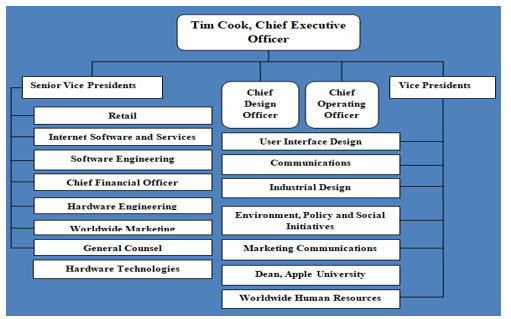Introduction
Apple Inc. is a multinational tech company based in California, the US. In terms of revenue, Apple is the largest technology firm, with approximately $365.8 billion as of June 2022. The company has been known for its market capitalization, whereby it has sold many computers and mobile phones. The company was founded in 1976 by Steve Jobs and others such as Ronald Wayne and Wozniak Steve. The company’s success has been through digital innovation that matches modern customer trends in technology. The common products in the market include iPhone, Apple Watch, iPad, and AirTag, among others. Apple has endured global success due to the maximization of devices’ capability by adding value to the internal structure of any handset it makes. There have been key marketing plans, and the quality of products makes consumers get interested in the products.
Description of the Organization
Apple designs and manufactures smartphones, personal computers, tablets, and other products and services, as seen in Figure 1. The company operates on various platforms, such as App Store, which allows clients to discover and download applications, books, music, and other digital content. Through digital subscriptions, Apple has succeeded in offering digital content, such as through Apple Arcade, Apple Music, Apple TV, and Apple Fitness (Smith, 2020). Apple sells all these products to a range of markets whereby individual consumers, small-scale businesses, and government agencies have been key customers. It is important to note that Apple has been regarded as one of the companies that created a class regarding what is offered in the market. Many consumers have raised the company’s reputation in social media, which has given a recommendable perception towards consumerism.
The firm is known for marketing its products through commercial ads and print media. The company has an official store and website that assists in leveraging the marketing of its phone, laptops, and other products. The target audience for apple is high-end product users, and that is why the company has been associated with premium branding that matches high customer services. Apple delivers innovative, up-to-date items that fit the market (Hern, 2018). With the current metrics put in place, Apple is gaining a high volume of sales which gives the company stability in the market. Therefore, the company is one of the competing firms globally regarding digital products, and the management is doing all it can to explore the market more.

One of the major moves that helped Apple explore the market right is the foresight to beat the competition. The firm identifies customers’ needs before the customers discover what they require. For instance, the introduction of iTunes saw a major shift in keeping music organized in a given platform. Other key tools include a voice-activated assistant enabled through company research and development (R&D) (Hern, 2018). Simplicity is another way that Apple has maximized to ensure it penetrates and gains significant returns on revenue from its sales. In this case, the interface for most of its devices is easy to utilize, and users can access various programs through their handsets, where most of them require simple logic.
The Organization’s Structure
Apple’s organizational structure is hierarchical and functional, where the chief executive officer (CEO) is the overall manager of the business. As shown in Figure 2 below, Apple’s organizational structure shows Tim Cook, the CEO, working with the senior vice president, chief operating officer, and chief financial officer (Livesay, 2022). Apple is a public company that shareholders own where it has over 16 billion shares as of 2022, and interested people have taken the opportunity to own the shares (Livesay, 2022). The aspect of a hierarchically organized structure is seen through the CEO assuming the highest rank in the company. The company comprises more than 132,000 full-time employees who facilitate the delivery of duties and products (Livesay, 2022). The benefit of using this structure is that it enables Apple to control all avenues of business through tight manning of operations, transactions, and interactions in and outside the company.

The other structure is seen in a product-based grouping that has contributed to the success of the organization’s business strategies. The multinational giant firm has divided its operations into subgroups such as services which include App Store, ApplePay, and Apple Music (Licsi, 2022). The other sets of grouping include Mac, iPhone, and iPad. This structuring of products is important because it enables empirical market segmentation, which means each item can be sold using a specific framework according to the customer’s desires. A product-based group is known as other products, which consists of Apple TV, iWatch, displays, storage handsets, and headphones (Livesay, 2022). These are more connectivity than computing, and many users, more so the youth, have loved purchasing from the store.
The company’s organizational structure gives its business model, which incorporates collaboration between various groups and divisions. Apple combines various business models such as direct sales, franchising, and advertised-based strategy (Zhang, 2022). Apple Inc. maintains that there should be an intensive and effective partnership with other groups within the company to create a unique portfolio that enables mass purchasing from different buyers. The firm’s board of directors (BODs) comprises eight members with distinct leadership roles within the company and helps interlink the divisions to maximize high sales volumes within a given market. Three members act as CEOs, while two are former personnel who occupy the chairman role (Pereira, 2022). Some key people in Apple’s BOD include former US vice president Albert Gore, former Boeing Company James Bell president, and BlackRock cofounder, Susan Wagner.
The other structure is evident in the functionality aspect of the company, which adds to its business model. The perspective allows the firm to neglect short-term financial targets when developing new items in the market that require significant investment (Zhang, 2022). Through functionality structure, Apple has been basing its bonuses and R&D on financial performance rather than funds from a specific product. Apple executives consider functionality moves a holistic approach that navigates deep into the market. In that way, the firm grows its reputation, hence its business’s success.
Range of External Influences That Might Impact Growth
Many factors influence whether or not a company will grow in a competitive market. The first matter determining Apple’s growth is a technology evident through microservices architecture and artificial intelligence. There have been highly innovative digital ideas that impact how business is done. For instance, Apple has developed Macs, iPods, and Apple Store applications due to the modern technology boost that is heavily employed to connect customers and the product (Lombardo, 2019). Adobe Systems has contributed to Apple’s growth due to the advanced software management metrics that it comes with.
Additionally, access to the website revolutionized everything, including Apple. It boosted its revenue by 30% after many buyers’ adoption of the internet (Lombardo, 2019). Technological advancements are witnessed every day, and Apple stands on sustainable ground since users have turned to be digitally active, positively impacting its business. Apple incorporated AI features in its phones through face-recognition elements, fingerprint sensors, and native sleep tracking. These ideas power the company to fit in modern business zones by utilizing technology (Gopani, 2022). With continued changes courtesy of tech, Apple can be assured of getting significant sales that will improve the company’s brands.
The other external factor that influences Apple’s growth is sociocultural aspects. The rising use of mobile phones increased dependency on digital handsets and changed the perception of the use of computers (Lombardo, 2019). These opportunities grant Apple a chance to grow because product demand goes high, meaning the company will have a market to deliver the required items. For instance, it is common to find students using smartphones and laptops in colleges and universities globally, and in most cases, Apple’s products are preferred (Smith, 2020). The other social factor that gives Apple a chance to grow is the status symbol. Many users have associated Apple products with class. As a result, people will maximize buying these products to satisfy the perceptional ideology of belonging to a particular click.
Apple will benefit significantly from the stable political perspectives in many countries since there are free trading zones. In this case, they will establish many outlets for manufacturing, distributing, and marketing their product, ensuring business continuity. For instance, due to the growing positive relations between the US and other countries, Apple has opened stores in more than 25 countries on six continents (Zhang, 2022). Currently, there are more than 518 stores globally. With the forecasted projections, there is a high likelihood that Apple will expand its business in other countries due to stable regional ties that encourage trading mutualism (Gopani, 2022). In Dubai, one of the most sought-after countries for exploration, Apple has a store in the Mall of Emirates which attracts global customer shopping when they visit the country. When there are controlled business interactions between the US and other countries, it gives hope to the management due to the existing sustainability in the operations.
Conclusion
Apple Inc. is an American-based multinational company that trades in digital devices and services to its customers. The company is a known manufacturer of iPhones, iPods, and Macs and developed an Apple Store that enables the selling of many of its products. The company’s current CEO is Tim Cook, who leads other executives in a hierarchical organizational structure. The company has a product-based structure where items are divided according to the type for easy market penetration. Various external factors, such as technology, shall impact Apple’s growth. Technology s advancing by the day, so the company will consider a wide array of functionality structures to produce desired products that fit modern consumerism trends. The other factor is sociocultural elements, which comprise increased smartphone and laptop usage and over-reliance on digital handsets. Political factors such as existing free trading allow the company to grow due to possible expansions in various parts of the world.
Reference List
Dudovskiy, J. (2021). Apple organizational structure: A brief overview – research-methodology, Research. Web.
Gopani, A. (2022). The successful AI products behind Apple’s $3 trillion valuation. Analytics India Magazine. Web.
Hern, A. (2018). From Macs to iPods and apps: How apple revolutionized technology. The Guardian. Web.
Licsi, A. (2022). iPhone: Status symbol or a gadget? Philstar. Web.
Livesay, J. (2022). Who owns the most shares of Apple? here’s a look at the company’s biggest shareholders. USA Today. Web.
Lombardo, J. (2019). Apple Inc. Pestel/Pestle Analysis & Recommendations. Panmore Institute. Web.
Pereira, D. (2022). Apple Business Model. Business Model Analyst. Web.
Smith, D. (2020). “Apple macOS and IOS System Administration,” 34(21), pp. 10–23. Web.
Zhang, X. (2022). “Analysis of business model and financial operation: Evidence from Apple”. Proceedings of the 2022 2nd International Conference on Enterprise Management and Economic Development (ICEMED 2022), 4(2), pp. 10–12. Web.